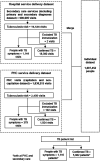The influence of provider payment mechanisms on TB service provider behavior in Indonesia: insights from National Health Insurance data and provider perspectives
- PMID: 40703178
- PMCID: PMC12283726
- DOI: 10.3389/fpubh.2025.1396596
The influence of provider payment mechanisms on TB service provider behavior in Indonesia: insights from National Health Insurance data and provider perspectives
Abstract
Background: The impact of provider payment mechanisms under Indonesia's National Health Insurance (NHI) scheme on healthcare providers' behavior-particularly in tuberculosis (TB) service delivery- remains underexplored. This study examines the consequences of provider payment incentives on TB service provider behavior.
Methods: A mixed-methods study was conducted using quantitative analysis of NHI claims data from 2015 to 2016 and qualitative data from focus group discussions with healthcare providers-22 primary care facilities and 14 hospitals across five provinces-. Quantitative analysis examined TB service utilization patterns, assessed referral appropriateness based on case complexity, and claim of TB services. Qualitative data were thematically analyzed to explore factors influencing provider decision-making in the context of payment mechanisms and service delivery under the NHI scheme.
Results: Findings indicate that primary care facilities refer a high proportion of TB cases to secondary-level care, even for uncomplicated cases (81% of 782 visits). Secondary care recorded significantly more TB visits than primary care (5,249 vs. 1,094 visits), resulting in an estimated USD 14.1 million in potentially avoidable costs for the NHI program. If these cases had been managed at the primary level, potential cost savings could have been substantial. Qualitative analysis revealed that provider referral decisions were influenced by capitation-based payment structures, limited diagnostic tools, absence of dedicated TB rooms, lack of provider capacity, patient preferences, financial incentives favoring more profitable diseases, and providers' social ties. The high rate of up-referrals may negatively impact service quality and TB treatment outcomes.
Conclusion: Current provider payment mechanisms under NHI contribute to inefficiencies in TB service delivery by incentivizing unnecessary referrals to secondary care. Optimizing payment methods and strengthening implementation by addressing weak provider capacity at the primary care level could enhance incentives for primary-level management of TB cases, improving cost-effectiveness and service quality.
Keywords: Indonesia; National Health Insurance; provider payment; referral; tuberculosis.
Copyright © 2025 O’Connell, Hafidz, Saragih, Cashin, Nugroho, Hatt, Farianti, Afflazier and Pambudi.
Conflict of interest statement
The authors declare that the research was conducted in the absence of any commercial or financial relationships that could be construed as a potential conflict of interest.
Figures
Similar articles
-
Payment methods for outpatient care facilities.Cochrane Database Syst Rev. 2017 Mar 3;3(3):CD011153. doi: 10.1002/14651858.CD011153.pub2. Cochrane Database Syst Rev. 2017. PMID: 28253540 Free PMC article.
-
Consumers' and health providers' views and perceptions of partnering to improve health services design, delivery and evaluation: a co-produced qualitative evidence synthesis.Cochrane Database Syst Rev. 2023 Mar 14;3(3):CD013274. doi: 10.1002/14651858.CD013274.pub2. Cochrane Database Syst Rev. 2023. PMID: 36917094 Free PMC article.
-
Financial arrangements for health systems in low-income countries: an overview of systematic reviews.Cochrane Database Syst Rev. 2017 Sep 11;9(9):CD011084. doi: 10.1002/14651858.CD011084.pub2. Cochrane Database Syst Rev. 2017. PMID: 28891235 Free PMC article.
-
[Volume and health outcomes: evidence from systematic reviews and from evaluation of Italian hospital data].Epidemiol Prev. 2013 Mar-Jun;37(2-3 Suppl 2):1-100. Epidemiol Prev. 2013. PMID: 23851286 Italian.
-
Barriers and facilitators to the implementation of lay health worker programmes to improve access to maternal and child health: qualitative evidence synthesis.Cochrane Database Syst Rev. 2013 Oct 8;2013(10):CD010414. doi: 10.1002/14651858.CD010414.pub2. Cochrane Database Syst Rev. 2013. PMID: 24101553 Free PMC article.
References
-
- WHO Global tuberculosis report 2024. World Health Organization, Geneva. (2024) Available online at: https://www.who.int/teams/global-tuberculosis-programme/tb-reports/globa.... (Accessed February 28, 2025).
MeSH terms
LinkOut - more resources
Full Text Sources
Medical


